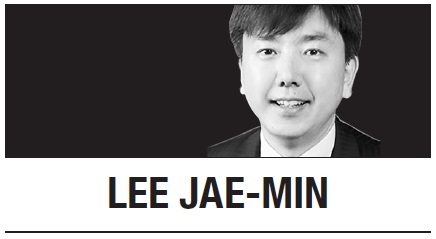 The June 24 incident should have never happened. This is the type of thing that wouldn’t happen in a country of law and order -- much less in a globalized metropolitan city like Seoul. Roughly 3,000 demonstrators “encircled” the US embassy in downtown Seoul marching with shouts and fist-raising, cutting off passage from the diplomatic compound to main streets. Demonstrations are part of daily life in Seoul, but such encircling (with the euphemism of “Human Belt”) has never happened in Seoul. Nor has it been tried in other major cities in peaceful times. That incident was startling, to say the least.
The June 24 incident should have never happened. This is the type of thing that wouldn’t happen in a country of law and order -- much less in a globalized metropolitan city like Seoul. Roughly 3,000 demonstrators “encircled” the US embassy in downtown Seoul marching with shouts and fist-raising, cutting off passage from the diplomatic compound to main streets. Demonstrations are part of daily life in Seoul, but such encircling (with the euphemism of “Human Belt”) has never happened in Seoul. Nor has it been tried in other major cities in peaceful times. That incident was startling, to say the least.
More startling was the fact that the encircling plan was approved by the court. The Seoul Administrative Court overruled the police’s initial banning of the encircling march, citing freedom of assembly and freedom of speech, and permitted it with some conditions -- only 20 minutes, and one time only.
Peaceful picketing and chanting in front of foreign embassies for political or diplomatic cause are common in any country, but thousands of people surrounding a foreign embassy is a different story. As much as such encircling is unprecedented, imposing a time limit does not alter the essence of the incident. Freedom of assembly and freedom of speech can be achieved by dozens of other means: There is simply no reason to surround a foreign embassy to exercise this right.
Here, we are not merely talking about diplomatic courtesy. Protecting foreign embassies and their staff is one of the core tenets of international law. As a matter of fact, modern international law started, after the Thirty-Year War in 1648, by protecting foreign emissaries. These norms are codified in the 1961 Vienna Convention on Diplomatic Relations, which imposes “a special duty” on states “to protect the premises of the (embassy)” and “to prevent any disturbance of the peace” or “the impairment of (the) dignity” of the embassy. Korea has been party to this convention since December 1970.
The June 24 demonstration was peaceful, in the sense that it did not employ any physical violence. Only shouts, slogans and chants with banners, flags and pickets. But at the same time, if “peaceful” in a strict sense means the absence of any pressure, threat or intimidation, it was not. By any account, thousands of people surrounding, hand in hand, a small compound had to be intimidating and imposing to those inside the enclave. It sounds like “disturbance of peace” or “impairment of dignity” as the terms are used in the said convention. In issuing the June 24 decision, the court stated that encircling should not pose a threat to a foreign embassy. This is a rationale hard to fathom.
Just imagine how we would feel if the same thing happened to a Korean embassy in another country. It will easily be one of the top stories of the 9 o’clock KBS News. Why should we not expect the same level of sensitivity and reaction from other countries?
In light of this, the decision of the Seoul Administrative Court on Aug. 14 to refuse permission of the same “Human Belt” plan during the Aug. 15 demonstration to surround the American and Japanese embassies in Seoul is all the more welcoming. This time, the court rejected the request referring to the Vienna Convention (finally) and other geopolitical developments, including the importance of alliance in the face of the mounting North Korean threat. The judicial branch’s attempt to explain geopolitical implications sounds rather bizarre, but its reference to the convention is accurate and appropriate. The Aug. 15 demonstration took place in the main streets before the US embassy but did not encircle the mission this time. Demonstrators’ messages were as effectively delivered. Which again raises the question of why not on June 24?
In a country where law and order are respected and upheld, things like foreign embassy encircling (let alone pointing a laser at the premise which happened this past January) are almost unthinkable. Demonstrations will and should continue in Seoul in the future. But they should never be used or permitted to inflict pressure on foreign missions or their emissaries.
By Lee Jae-min
Lee Jae-min is a professor of law at Seoul National University. He can be reached at jaemin@snu.ac.kr. -- Ed.
- Chinese man behind drug scam targeting teens nabbed in Cambodia
- Seoul envoy for N.K. human rights urges solidarity in Argentina, Mexico
- Yoon, Romanian president to hold summit in S. Korea next week
- S. Korea voices strong regrets over Japanese textbooks distorting wartime history
- [Herald Interview] Lim Yunchan: Chopin album feels like long-awaited eruption
- Discover awarding-winning Korean literature at 'Springing to Life' exhibition
- Seoul Outdoor Library reopens with expansion to Cheonggyecheon
- Local govts. seek to attract foreign residents amid population decline
- Seoul shares rattled by Israeli attack on Iran; Kospi dips to nearly 11-week low
- [Today’s K-pop] Illit drops debut single remix







![[Graphic News] More Koreans say they plan long-distance trips this year](http://res.heraldm.com/phpwas/restmb_idxmake.php?idx=644&simg=/content/image/2024/04/17/20240417050828_0.gif&u=)
![[KH Explains] Hyundai's full hybrid edge to pay off amid slow transition to pure EVs](http://res.heraldm.com/phpwas/restmb_idxmake.php?idx=644&simg=/content/image/2024/04/18/20240418050645_0.jpg&u=20240419100350)





![[From the Scene] Monks, Buddhists hail return of remains of Buddhas](http://res.heraldm.com/phpwas/restmb_idxmake.php?idx=652&simg=/content/image/2024/04/19/20240419050617_0.jpg&u=20240419175937)

![[KH Explains] Hyundai's full hybrid edge to pay off amid slow transition to pure EVs](http://res.heraldm.com/phpwas/restmb_idxmake.php?idx=652&simg=/content/image/2024/04/18/20240418050645_0.jpg&u=20240419100350)

![[Today’s K-pop] Illit drops debut single remix](http://res.heraldm.com/phpwas/restmb_idxmake.php?idx=642&simg=/content/image/2024/04/19/20240419050612_0.jpg&u=)